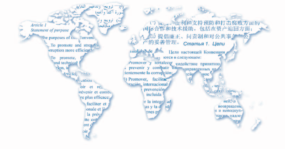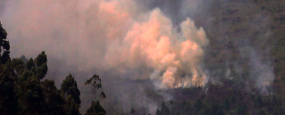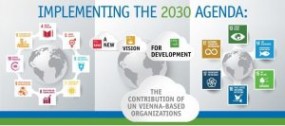Posted on 04 Jun 2016
The 25th session of the United Nations Commission on Crime Prevention and Criminal Justice (UN Crime Commission or CCPCJ) was held in Vienna from 23 – 27 May 2016 with approximately 1000 delegates from the governments, NGOs and academic community in attendance.
It was the first session after the adoption of the 2030 Agenda for Sustainable Development (ASD 2030 endorsed at the General Assembly in September 2015) which, through Goal 16, brought rule of law and governance issues squarely onto the agenda for the first time. While the linkages between justice and development have been discussed in the past – several United Nations Congresses on Crime Prevention and the Treatment of Offenders/Criminal Justice have emphasized the linkage between crime challenges and development – never before has such a linkage been formally recognized though a set of specified goals and indicators to monitor progress.
While the Commission formally acknowledge crime issues, crime prevention and criminal justice responses to global crime challenges as an integral part of the ASD2030, little headway was made to define what this might mean in practice. Despite work amongst civil society actors in this area, including, for example the Global Initiative’s contributions to understanding organised crime as a development issue and as a cross-cutting spoiler to the ASD2030. The main outcome was the clear acknowledgment of UNODC’s position within the Sustainable Development Agenda, but it did not define a strategic programme of systematic UNODC’s contribution to its implementation.
A number of development-related specific issues received special attention at the 25th session of the UN Crime Commission, such as wildlife crime, human trafficking and smuggling of migrants, trafficking in cultural property and partnership with other international organizations (e.g. INTERPOL; International Consortium on Combatting Wildlife Crime). But similarly, these were ‘informational’ rather than executive discussions with a decision on implications for implementation.
For example, the first World Wildlife Crime Report: Trafficking in protected species, was launched by the UNODC Executive-Director, Mr. Yury Fedotov and Mr. John Scanion, the Secretary –General, CITES Secretariat in presence of the World Customs Organization, UNDP and WWF International. The Report focuses on general issues around illegal trade forms of wildlife into both illegal retail markets as well as into legal commercial streams. Eight case studies of the largest illegal flows were presented (e.g. furniture; art, décor and jewelry; cosmetics and perfume; food, seafood, tonics and medicines). It calls for national laws to prohibit possession and trade of illegally harvested wildlife; international support; promotion of commercial traceability mechanisms, profiling, forensic science; anti-corruption interventions. The session, however, remains silent on any discussions of strengthening response through an international instrument.
Similarly, in spite of being labeled a ‘high level event’ on human trafficking and smuggling of migrants, clearly one of the most pressing prevailing problems facing states today, geopolitical limitations did not appear to allow for much innovation, and no resolution was adopted on the subject.
As has become increasingly the case in these Vienna sessions, the formal agenda was accompanied by a very rich and plentiful programme of side-events and exhibits. Several side events were devoted to the issue of women, girls, children and crime, terrorism, prison management issue, corruption, etc, including the two organized with the Global Initiative. While the side events are a mixed-bag in terms of thematic orientation, innovation and productivity, they do provide a democratic forum for many NGOs and governments, the UN institutes and academia to inform the international crime prevention and criminal justice community about their interests and work, and to draw attention to certain issues that are either emerging or being marginalized from the the government-driven formal Crime Commission agenda.
In short, the 25th session of the UN Crime Commission was no ‘major event’ session. It adopted only six resolutions (finally a manageable number) on diverse issues such as restorative justice (back on the agenda), trafficking in human organs (previously a somewhat neglected issue), youth crime prevention (back on the agenda, too), legal aid, sustainable tourism and the 14th UN Crime Congress to be held in Japan (2020). Arguably, however, these are niche issues, rather than the priority criminal justice concerns of an increasingly turbulent world.
Perhaps the time has come to rethink and reposition the role of the UN Crime Commission? Both the Palermo (UNTOC) and Merida (UNCAC) Conventions and their Conference of States’ Parties offer similar forums to advance these overlapping agendas. Judging on the merits of this most recent and lacklustre iteration, the UN Crime Commission apparently lacks a compelling mandate, strategic vision and engagement for the UN crime programme both within its classic business area and within framework of the 2030 Sustainable Development Agenda.



